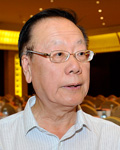Keeping the Peace
 0 Comment(s)
0 Comment(s) Print
Print E-mail Beijing Review, September 3, 2012
E-mail Beijing Review, September 3, 2012
At present, the international security situation has become more complicated, while the process of international arms control and disarmament remains at a standstill. Li Changhe, a senior advisor of the China Arms Control and Disarmament Association and a former ambassador of disarmament affairs, recently spoke to Beijing Review reporter Chen Ran in an exclusive interview, sharing his views on China's role in nonproliferation and arms export control. Edited excerpts follow:
Beijing Review: How do you see the current state of international arms control and disarmament?
 |
|
Li Changhe |
In the 21st century, international arms control and disarmament remain in the doldrums despite the progress the international community has made.
On April 5, 2009, U.S. President Barack Obama pledged to lead a quest for a world free of nuclear weapons in a speech in Prague, aiming to reduce the importance of nuclear weapons in the U.S. national security strategy. However, Obama's proposal has made no difference to the United States, as the country has well developed modern weapons beyond nuclear forces, particularly the anti-missile system. On April 8, 2010, the United States and Russia signed the New Strategic Arms Reduction Treaty, which is a significant step in nuclear disarmament since the Strategic Arms Reduction Treaty in 1991.
Since the second half of 2010, international arms control and disarmament have once again bogged down. The entry into force of the Comprehensive Nuclear Test Ban Treaty still needs a long process. The Geneva-based Conference on Disarmament, the single multilateral disarmament negotiating forum, has not been able to carry out substantive work on issues such as the prevention of an arms race in outer space over the past 15 years. Regional nuclear issues in Iran, North Korea and other places are still pending. In early July, countries began the negotiation of the Arms Trade Treaty at the UN, designed to formulate the first binding treaty to control the exports of conventional weapons. With no agreement reached, the treaty will be delivered to the 67th session of the UN General Assembly later this year. And I believe for now, it is very difficult to reach such a binding treaty.
The complexity of the international security situation, the rise of unstable and uncertain factors, and the lack of adequate strategic mutual trust and sense of security between nations, especially between powers, are the root causes that hinder international arms control and disarmament. What's more, the Cold War mentality still exists in some places. Strategic competition over international order, comprehensive national strength and geopolitics also becomes increasingly fierce. All of these will accelerate further military rivalry.
Under the current circumstances, what can China do to boost the stagnant international arms control and disarmament process?
China has kept an independent but cooperative stance on international arms control. It has participated actively and constructively in the activities of international arms control and disarmament as well as nonproliferation, advocating fair and reasonable arms control rules.
China is one of the five nuclear-weapon states under the Nuclear Nonproliferation Treaty, which also include the United States, Russia, France and Britain. Its nuclear arsenal, however, is the smallest among the five. Since reform and opening up started at the end of the 1970s, China's national strength as well as its defense capacity have made much progress. China pursues an independent foreign policy of peace. It therefore focuses its military strategy more on defense than offense and keeps a minimum nuclear deterrence.
China has promised never to be the first to use nuclear weapons at any time and under any circumstances. What's more, it has made the unequivocal commitment that under no circumstances will it use or threaten to use nuclear weapons against non-nuclear-weapon states or nuclear-weapon-free zones. All these have amply demonstrated that China's nuclear weapons are for self-defense.
China is against an arms race and will not involve itself in an arms race. Regarding international nonproliferation, China has always supported the international community's efforts toward the nonproliferation of weapons of mass destruction. China doesn't support Iran and North Korea's attempts to obtain nuclear weapons. China aims to resolve the nuclear issues of the two countries through peaceful talks.
In the meantime, China shares a lot in common with Western countries on issues such as achieving a nuclear-free world, supporting nuclear-weapon-free zones and restricting arms exports. But there are differences. The West sometimes uses the prevention of the proliferation of weapons of mass destruction as a tool to serve the interests of their foreign policy and even use it as an excuse to overthrow the government of a sovereign state. China is totally against such practices.






Go to Forum >>0 Comment(s)